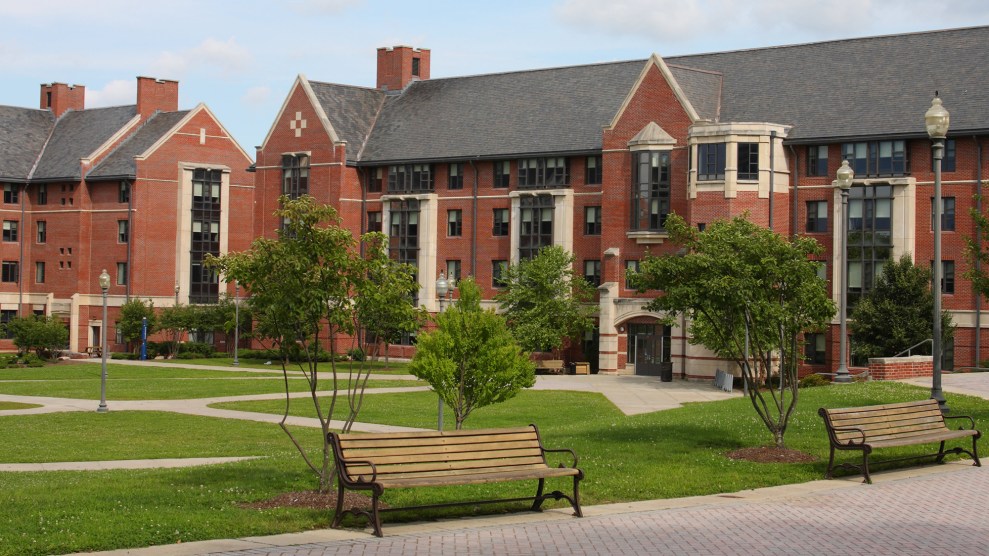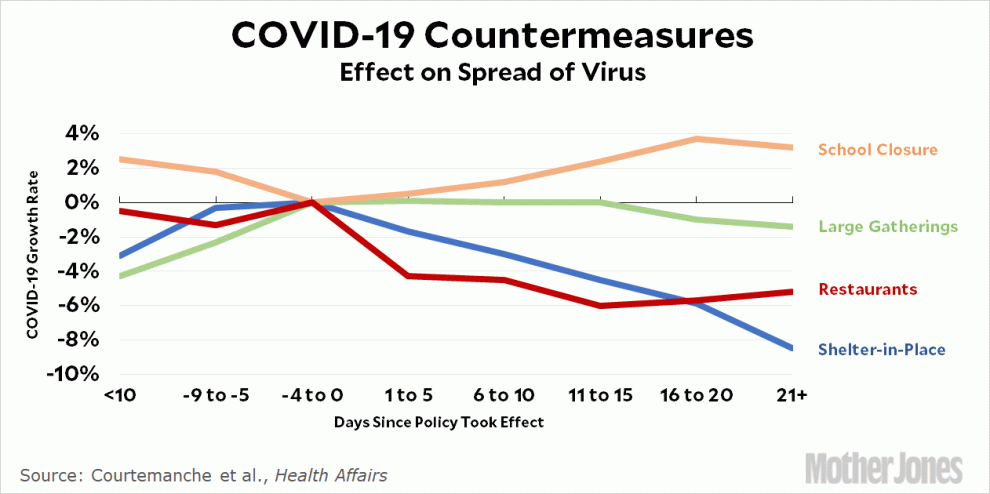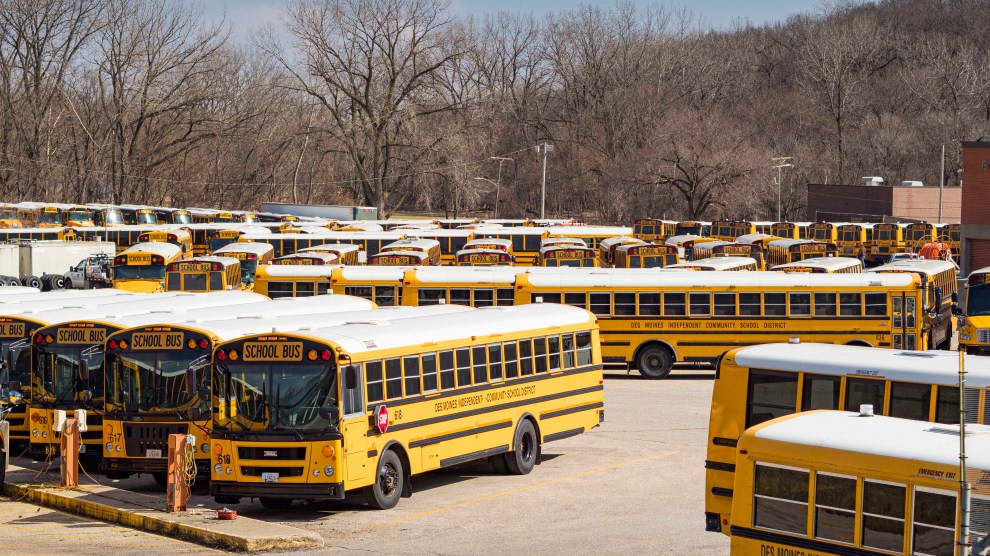
The University of Connecticut shut down its campuses on March 12, 2020.Dennis Tangney Jr/GETTY
As seniors graduate from high school and wonder about September, and parents enter their third month of homeschooling following coronavirus closures, two questions seem to preoccupy everyone: When will schools open, and what will they look like when they do?
On the Mother Jones Slack channels, data has been considered, theories posited, and lots of questions asked. Could schools hold classes outside? What’s the incidence of coronavirus infection in children? How will this impact decisions to reopen schools? Which universities are doing what to plan for the fall? Our reporter Kara Voght often offered key insights in these discussions, partly because she covered education before politics, but also because she has a trusted inside source. Her mom, Donna Korbel, is assistant vice president for students affairs and the director of the Center for Student Disabilities at the University of Connecticut (UConn), where she’s worked for the past 27 years. Without disparaging her journalist daughter’s professional choices, Korbel likes to joke that she doesn’t understand why anyone would want to work anywhere without a marching band.
The University of Connecticut, a public research university, serves more than 19,000 undergraduate students. Seventy-five percent of those students live together on campus in classic dorms where everything is shared. The campus is at the heart of the college experience at a school like UConn, which has a student population the size of a small town. But like colleges and universities across the United States, when the coronavirus outbreak hit, UConn shut down its campus, sent students home, and took classes online. For the past few months, Korbel and her fellow administrators have been trying to figure out how they can safely reopen the campus.
Since we’re both working from home and social distancing, I caught up with her via Zoom to get an inside look at how university administrators are thinking about reopening their campuses. This is what she had to say, edited for length and clarity:
On the hazards of communal living
We know our students want to come back to campus. This is not the college experience that they signed up for. But we have to be concerned with health and safety. When you think about reopening an overwhelmingly residential campus, and look at the social distancing requirements that are in place, and the recommendations for testing—it’s complicated. Many of our residence halls are over 50 years old, and they were built at a time when there was an emphasis on communal living. You had a roommate, you shared a bathroom, you share a living space, and all of that flies in the face of what’s appropriate in a COVID-19 environment.
I’ve worked in student affairs now for 40 years and I’m all about the student experience. Thinking about that student experience, there are all the operational questions: How to feed them? We can’t have dining halls open, so it’s takeout. Well, where will they eat? Are we expecting that students will pick up their meals and go back to their rooms by themselves and eat? That’s just not behavior consistent with everything I know about somebody between the ages of 17 and 24.
On when UConn will reopen
Many schools have made their decisions about the fall already. We’re not going to make ours until June. UConn is between New York and Boston. New York and Boston are hotspots for the disease. We have a campus in Stamford, which is 20 minutes outside of New York City, the epicenter of the disease. We’re not going to take any chances. We will do this with an abundance of caution with the best information that we possibly can. We know that at least part of our instruction will need to be online for the fall, just based on social distancing necessities.
We are very much working off the guidance of our governor, Ned Lamont, and the higher-education COVID task force. We’re an outlier in Connecticut because we are such a large residential campus. But some of the guidelines remain the same in terms of monitoring, testing, containment, quarantine. How do you plan for keeping students, faculty and staff, safe? How can you safely house them? Can you bring them all back? Should you only bring back 50 percent? Even if you bring back 50 percent, how do you make that decision? There are lots of moving parts and just so many questions the issues around the availability of the kinds of testing equipment that we’ll need, and the monitoring.
On minimum testing requirements for reopening
Everyone would need to be tested. There’s not a different standard for faculty, students, or staff. Everyone would need to be tested coming onto campus—details to be determined but most likely when they get to campus—and would that be repeated like somewhat regularly. The guidelines also call for us having a place where people can be safely quarantined.
On scenarios that administrators are considering
We have several different models that we’re looking at. As a university we always have committees, right? We have academic committees, we have student life committees, we have the facilities committee looking at capacity of classrooms.
For a university our size, we don’t really have lots of large lecture halls. That’s always been a big strength of UConn, and students have really appreciated that we don’t have the kind of big lecture halls that you ordinarily expect at a Research I. Nonetheless, even with a classroom of 70 seats, or 35 seats, you don’t have that capacity anymore when you have to see people six feet apart. So the Facilities Committee is working on coming up with a new capacity is for classrooms—maybe repurposing the dining halls? Dining halls are very difficult for social distancing, even in terms of meal prep. Our dining halls weren’t designed so that people could stand six feet apart while either serving or preparing foods. So just looking at every possible scenario in terms of how we think about space differently.
On the idea of a staggered opening, where first-years and juniors are on campus from September to October, sophomores and juniors from November to December
That was a model that we looked at. Our medical folks looked at that and said, it’s difficult for us to think about every couple of weeks bringing new people to campus who would have to self-quarantine for 14 days. You really would need to self-quarantine. Seventy percent of our students come from Connecticut, and for the rest we draw a lot from New Jersey New York. The staggered [opening] may work for some campuses. We have to talk about the scale at UConn.
On technology requirements for an online education
Yesterday, I was on a call with the group where we’re talking about technology. It’s an equity issue. When you move to an online environment, you can’t make assumptions that everyone has a state-of-the-art laptop or desktop and high speed internet and smartphones. We certainly found that that wasn’t the case. So we’ve been reaching out to students and trying to provide assistance through our Students First Fund. Our IT departments scrambled to find every laptop and iPad that was available on campus. Just so many issues. In the spring semester, we had to do a quick pivot and do the best we could.
On students with unique learning accommodations
We work with over 4,300 students with disabilities. Each semester, students are evaluated based on their coursework and what their accommodation needs are. Some students may opt not to come back to campus because they’re in a compromised situation. We have students who are receiving treatment for cancer. We have students who have autoimmune conditions. Students will not be denied the opportunity to study online.
The primary population of students that we work with are students who have psychiatric disabilities. This is a very difficult time for people, for all of us. Feelings of loneliness and trying to adjust to this is just a very different experience. Students are having difficulty engaging in therapy because, in some cases, their family members didn’t know they were in therapy. It feels very different to be talking about things with your therapist when you’re at home. They don’t feel particularly private in their home, even if they have a private space. And we’re very aware that not everybody has a home to go to. So when students left campus, we had about 1,200 students that for whatever reason—whether they were international students or just didn’t have situations where they feel they could return to—they were allowed to stay on campus until the end of the semester.
On the possibility of being sued if campus reopens and students get sick
That’s a national issue that every college is grappling with and thinking about. We will be making a decision locally, but we will be following the best advice that’s out there. Our president has been very, very, clear about that. I always joke about academia, we are the people who still wear clothes from the Renaissance. So we tend to be pretty stable. We are certainly going about this in a very thoughtful and purposeful way.
On how the coronavirus is affecting enrollment for the 2020–2021 school year
Our enrollment numbers are up. When we say enrollment numbers, that means deposits. Students needed to make that commitment by May 1. Some colleges pushed that deadline out, we did not. UConn is a very popular brand. So we have a robust number of students who indicate that they want to come, but we also know that it depends what September looks like. Students may opt to take a gap year, or just opt to stay closer to home. There’s so many things, and we’re aware of that. Every decision we make will affect actual enrollments for fall.
On whether she’s ever seen anything like this in her 40 years of working in student affairs
No. There isn’t even anything that comes comes close. We missed all the end-of-the-year celebrations. We had a YouTube graduation, and we’re hoping to have a ceremony in October. All of those things are just extremely difficult because they’re very personal.
On her favorite part of her job
Oh, students. Interacting with students, working with students, being on a college campus. There is just something remarkable about watching the transformation of students. I started my career as a rehabilitation counselor. My whole philosophy of rehabilitation is that you create an environment where people can become as independent as possible. UConn has remarkable opportunities for students with disabilities. To be able to work where I can facilitate the environment for people to achieve maximum independence, I just feel like I’m one of the luckiest people in the world. I had the good fortune to do this work in a place I love.
Closing thoughts
We miss students as much as they miss us. We are being so thoughtful and so deliberate about not only making sure that we give them the best possible experience that we can, but also that we do it safely. Part of the role of a great university is to produce citizens. The way that you do that, lots of times, is through your co-curricular activities. We understand that students will remember lots of things about their college experience. They’ll remember their freshman English class. But most often they’ll remember the clubs and organizations, the parties, the conversations they had in the residence halls, the dining halls, going to a sporting event. We are very cognizant of that. We want to make sure you know we want to bring them back as soon as we can as safely as we can, and give them all the things they’re missing.



















